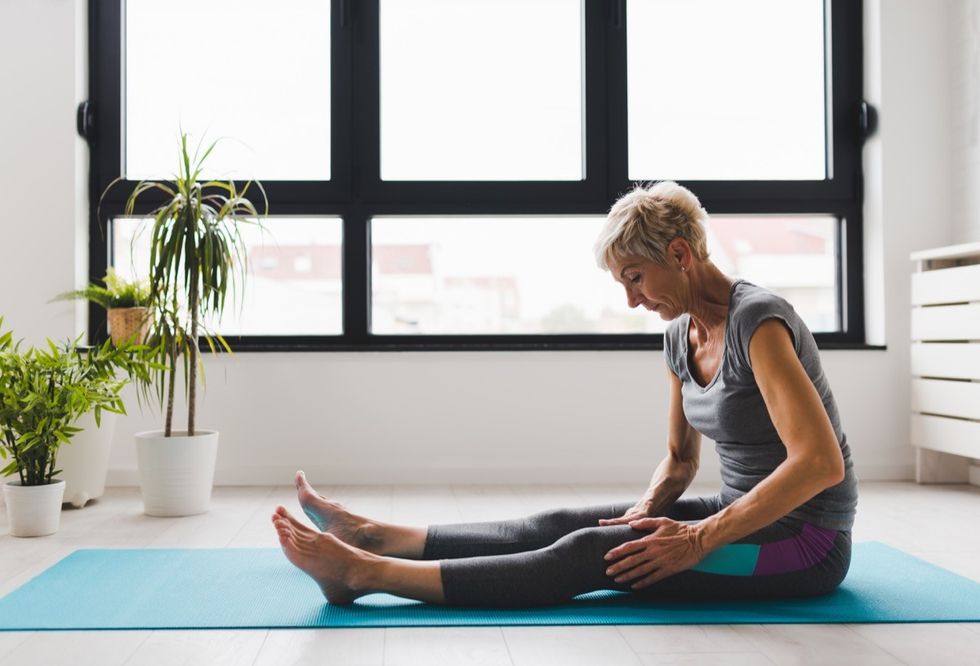Men like to think they know a lot about women, but women—in both mind and body—are complex. While we can't necessarily help men understand what their girlfriend or mother is thinking, after talking with experts we can let them in on a few interesting and intimate facts about women's bodies they probably didn't know. And for more gender health knowledge, check out 17 Diseases More Common in Men Than in Women.
1 | Women can see a larger spectrum of colors than men.
 Shutterstock
ShutterstockIf you've ever felt like women and men see the world differently, you're not totally wrong. A study led by psychology professor Israel Abramov found that "women were more adept at distinguishing between subtle gradations than were men," according to Smithsonian Magazine. This disparity was most apparent in the middle of the color spectrum—Abramov found that women were better able to distinguish tiny differences in color hues that were yellow or green. For tips on how to stay calm during the coronavirus pandemic, check out 17 Mental Health Tips for Quarantine From Therapists.
2 | Women have a better sense of smell.
 Shutterstock
ShutterstockFor better or worse, women have a stronger sense of smell than men. A study published in PLOS ONE found that "women’s brains have up to 50 percent more olfactory neurons." And while scientists believe this is likely a contributing factor to women's superior sense of smell, they think there is more to it than that. According to Medical News Today, some experts believe "a superior sense of smell helps mother and child to bond after birth" and "influences females’ selection of potential mates."
3 | Women's brains are better suited for remembering details.
 Shutterstock
ShutterstockWomen's more sizable hippocampus and prefrontal cortex (PFC) are responsible for some of the differences between how men and women think.
"The PFC controls social behavior, cause and effect thinking, and judgment," says Kimberly Langdon, OBGYN and medical advisor at Medzino Health. "[It] develops at a younger age in girls, and this is why they take fewer risks than boys of the same age." The PFC is also responsible for why women have a more acute capacity for details. "Women include more details in their decision-making or in conversations, which is why men think they talk more or take longer to express themselves," Langdon says.
4 | Women's bodies can't process as much alcohol as men's can.
 Shutterstock
ShutterstockThe longstanding belief that women generally get drunk more readily than men has some scientific backing to it. "Women have less of an enzyme that breaks down alcohol before it can get into the bloodstream, which is why women get inebriated on less amount of alcohol," says Langdon. So, the level to which you get intoxicated is not fully dependent on weight and muscle mass, as is commonly believed.
5 | Women have stronger immune systems than men.
 Shutterstock
ShutterstockThroughout the coronavirus pandemic, we've seen the virus infecting men at a higher rate than women. While this could be a result of a few factors, women have been proven to fight off infections better than men at every age.
"It’s partly due to estrogen—in the younger years—but also due to the extra X chromosome," says Felice Gersh, MD, founder and director of the Integrative Medical Group. "Some of it stays active throughout the entire female’s life, and it endows her with a more powerful immune system." For more information on the role gender plays when it comes to COVID-19, check out Here's Why Men Die From Coronavirus More Than Women.
6 | Women feel pain more acutely than men do.
 Shutterstock
ShutterstockThis fact blows the long-held belief that men are stronger than women out of the water.
"Women have more immune cells and respond more robustly to injuries and infections, which results in a heightened pain response," says Gersh. And a study published by the Journal of Pain found that when it came to "a number of different diseases, including diabetes, arthritis, and certain respiratory infections," women reported feeling more pain than men.
Neuromusculoskeletal specialist Lawrence Barnard, DO, says women "experience worse pain and discomfort in their joints, specifically," and they are more likely to experience arthritis. "We all know that women have an incredible threshold for pain, as seen in childbirth and other awesome feats, but this little fact isn't meant to minimize their capabilities, but showcase how they do experience more pain and aches," Barnard says.
7 | Vaginas are self-cleaning.
 Shutterstock
ShutterstockDischarge—sometimes seen in women's underwear—is part of the vagina's self-cleaning process. "That’s why only the external vulva and labia requiring cleaning," says Langdon. The mucus produced in the cervix, which is at the top of the womb, is the body's way of cleaning what women cannot otherwise reach. For more expert information on bodies, check out 40 Subtle Signs Your Body Is Telling You Something's Seriously Wrong.
8 | The clitoris has twice the nerve endings a penis has.
 Shutterstock/Olena Yakobchuk
Shutterstock/Olena YakobchukIf you think you know all about the elusive clitoris—think again.
"The clitoris is a large neurological bundle, and what is visible externally is just its tip!" says Gersh. "The clitoris has an external and internal part. It dives down both sides of the vulva and can be up to 4 inches long," says
In addition to noting that clitoris has both external and internal parts and can be up to four inches long, Kameelah Phillips, MD, founder of Calla Women's Health, adds: "The clitoris has about 8,000 nerve endings, which is about twice that of the penis. All of these nerve endings can make rough touch very sensitive, so slow down and give her some respect."
9 | Women store fat around the hips, abdomen, and buttocks.
 iStock/Peopleimages
iStock/PeopleimagesNot all bodies are the same, but fat stores are most commonly found on women around the hips, abdomen, and buttocks. Langdon says this is "to keep the fat stores (food) near the growing uterus and fetus during pregnancy." Women's bodies start preparing for childbearing well before they even consider conceiving. To learn about how feeling overwhelmed impacts your health, check out 23 Terrifying Ways Stress Wreaks Havoc on Your Body.
10 | Women experience less heart disease than men.
 Shutterstock
ShutterstockIf you're thinking women have less heart disease because they have less stress in their lives, you would be wrong. "The hormones of premenopausal women seem to be protective against heart disease," says fertility expertZaher Merhi, MD, OBGYN. This logic tracks when you consider that "women have fewer heart attacks than men prior to menopause, but by age 65, they are equals," according to Gersh.
11 | Sperm lives longer than the egg in women's bodies.
 Shutterstock
ShutterstockWomen's bodies allow the foreign sperm to live much longer than their own egg inside their reproductive system. "While the egg lives for one day after ovulation, the sperm lives for [on average] three days after ejaculation inside the woman's body," says Merhi. According to Natural Cycles, more determined sperm can survive as long as five days in a women's reproductive system.
12 | Women make testosterone.
 Shutterstock
ShutterstockWhile testosterone is often thought of as the male sex hormone, women do actually produce some as well. For women, testosterone "is needed for sex drive and bone formation/health," Langdon says. However, women do make the hormone at much lower quantities than men do.
13 | The vagina shrinks after menopause.
 Shutterstock
ShutterstockThe vaginal shrinkage that follows menopause is a result of the decline in estrogen. Additionally, vaginal "lining becomes smooth with less rugae [or ridges]," says Langdon.
14 | Sex can be painful.
 Shutterstock
ShutterstockWomen's sex organs are more delicate and complex than is often understood. One example in which this becomes clear is: "bumping the cervix during intercourse, [which] can cause pain due to the nerve supply of the cervix," Langdon says. She adds that this is why having sex with men that have larger than average penises can be uncomfortable and is "not the end game."
15 | Women's menstrual cycles can sync up.
 Shutterstock
Shutterstock"In ancient times, women cycled together with the phases of the moon," Gersh says. Even in modern times, women often find themselves menstruating at the same time as their roommates or friends. According to Healthline, period syncing—also known as "menstrual synchrony" and "the McClintock effect"—is based on the theory that when a woman comes into physical contact with another woman, their pheromones influence each other causing their monthly cycles to line up.
16 | Women get more cavities than men.
 Shutterstock
Shutterstock"There are a host of studies that have found that tooth decay is more prevalent in women," says Pia Lieb, DDS, founder of Cosmetic Dentistry Center NYC. "This is due to things such as salivary composition and flow, hormone fluctuation, and dietary habits."
According to a study by the University of Oregon, these disparities between genders go back to the hunter-and-gatherer days, Science Daily reported. John R. Lukacs, a professor of anthropology who specializes in dental research, said, "Reproduction pressures and rising fertility explain why women suffered a more rapid decline in dental health than did men as humans transitioned from hunter-and-gatherers to farmers and more sedentary pursuits."
17 | Women smile more than men.
 Shutterstock
Shutterstock"Women smile about 62 times—or more—a day, compared to men who smile eight times a day, on average," says Lieb. This fact begs the question, are women happier on average, or do they feel the need to seem happier more frequently?





